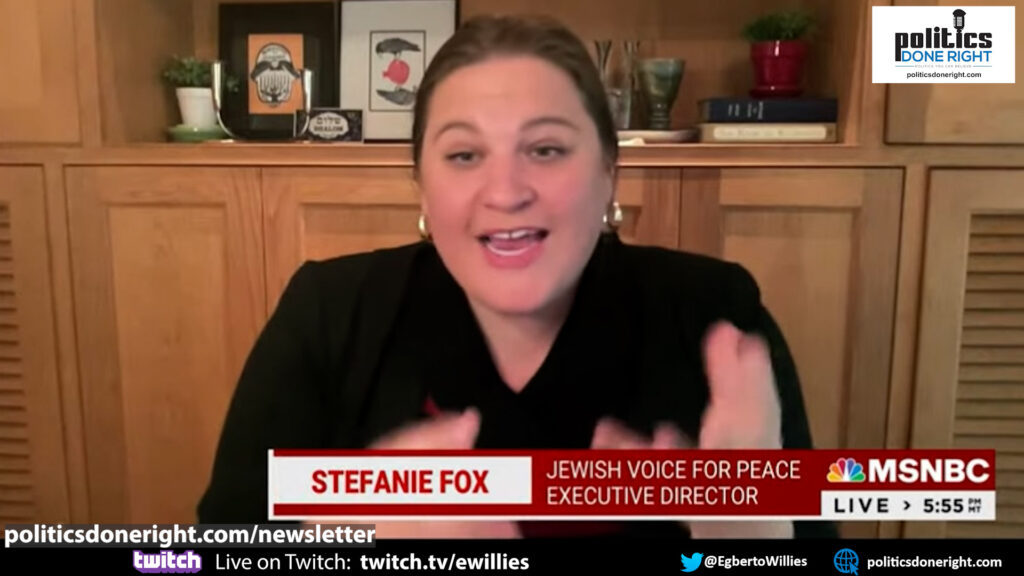Jewish Voice For Peace Executive Director Stefanie Fox appeared on The Reid Out with Joy-Ann Reid, calling for a cease-fire. She said Israel is being genocidal against the Palestinians in Gaza.
A genocidal war?
In the complex and emotionally fraught Israeli-Palestinian conflict, narratives often become weaponized, serving the interests of one side or another. However, the recent commentary by Jewish Voice for Peace Executive Director Stefanie Fox is very compelling. It focuses on the fundamental principles of human dignity and the right to life, safety, and freedom. By describing the Israeli military actions in Gaza as part of a “genocidal war,” Fox places the ongoing conflict into a larger ethical framework that challenges our collective conscience.
In the video clip:
- The Executive Director of Jewish Voice for Peace, Stefanie Fox, expressed deep concerns over the Israeli government’s actions in Gaza, describing it as a “genocidal war.”
- Fox and her organization led a large protest involving 5,000 Jews and 25 rabbis, demanding the U.S. call for an immediate ceasefire between Israel and Hamas.
- While acknowledging the terroristic acts perpetrated by Hamas, the moral authority of Israel’s disproportionately harsh response in Gaza was questioned, highlighting that 42% of structures in Gaza are damaged or destroyed.
- A comparison was made between the treatment of protesters during the Capitol riot and peace activists, noting that hundreds from the latter group were arrested while calling for a ceasefire.
- Despite increased hate crimes against Jewish individuals, Fox argues that the core Jewish value “b’tzelem Elohim” implies that every life is precious. Thus it is inconceivable for Jews not to fight to end genocide.
It’s crucial to recognize that the term “genocidal war” is laden with historical weight and ethical implications. While some may argue that the term is too strong or imprecise, the fact remains that Fox’s statement signals a dire humanitarian situation that demands immediate attention. According to UN reports, the conditions in Gaza have been abysmal for years, exacerbated by blockades and military actions that have led to mass impoverishment and deprivation. When 42% of a city’s structures are damaged or destroyed, it’s hard not to question the ethical foundation of the operation causing such devastation.
The activism led by Jewish Voice for Peace, involving 5,000 Jews and 25 rabbis, signifies a watershed moment. The organization orchestrated what they claim to be the largest demonstration in the history of Jews in solidarity with Palestinians, demanding an immediate ceasefire. This kind of activism disrupts the traditional dichotomy often presented in mainstream media—that of Jews uniformly supporting Israel and Palestinians opposing it. Fox’s initiative thus underscores that a significant portion of the Jewish community does not align with the actions of the Israeli government. This distinction is essential for fostering a more nuanced understanding of the conflict.
The discussion on the dissonance between how peace activists and Capitol rioters are treated is probative. The quickness to arrest peace activists advocating for a humanitarian cause, while insurrectionists on January 6 were allowed to go home, reveals a glaring bias. This uneven application of law enforcement serves as an eye-opening moment, raising questions about whom the U.S. government really serves and protects.
The rise of hate crimes against Jewish people cannot be ignored, and neither can the sentiments of Jewish Americans who feel abandoned by the left. Fox’s reminder of the core Jewish value “b’tzelem Elohim,” which teaches that every life is precious, serves as a counter-narrative. It suggests that true Judaism, or any faith for that matter, should direct its followers to oppose systemic, state-sanctioned violence, thereby affirming the interconnectedness of all struggles for social justice.
Fox’s initiative and commentary open the doors for broader coalitions that span ethnic and religious lines. The moral imperative to act against oppression—rooted in her Jewish faith—serves as an invitation for people of other faiths and backgrounds to engage in shared activism.
Stefanie Fox’s position serve as a critical intervention in the existing discourses surrounding the Israeli-Palestinian conflict. They offer not just a critique but also a path forward that is grounded in humanitarian principles and the respect for human dignity—a path that questions state violence, no matter where it occurs, and calls for solidarity that transcends national and religious boundaries.
Viewers are encouraged to subscribe and join the conversation for more insightful commentary and to support progressive messages. Together, we can populate the internet with progressive messages that represent the true aspirations of most Americans.

